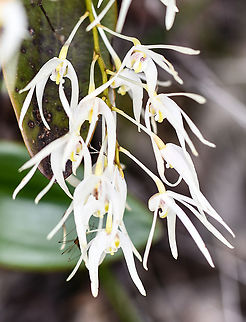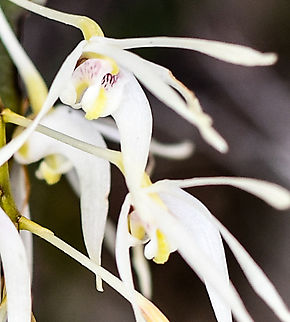
Appearance
"Dendrobium teretifolium" is an epiphytic or lithophytic herb with hanging, zig-zagged, branched stems, 0.5–2 mm long and 2–4 mm wide forming bushy clumps. Its leaves are circular in cross-section, 300–600 mm long and 4–6 mm in diameter and hang down. The flowering stems are 50–100 mm long and bear between three and fifteen crowded, white, cream-coloured or greenish, crowded flowers. The flowers are 20–30 mm long and 30–40 mm wide with red or purplish marks in the centre. The sepals are 20–30 mm long, about 3 mm wide and spread widely apart from each other. The petals are a similar length but only about 1 mm wide. The labellum is curved, 20–30 mm long, about 5 mm wide with three lobes. The side lobes curve upwards and the middle lobe has a long, thin tip, crinkled edges and three wavy ridges on its top. Flowering occurs from July to August.
Naming
"Dendrobium teretifolium" was first formally described in 1810 by Robert Brown and the description was published in his "Prodromus Florae Novae Hollandiae et Insulae Van Diemen". The specific epithet is from derived from the Latin words "teres" meaning "rounded": 249 and "folium" meaning "a leaf".: 123Distribution
The thin pencil orchid grows on rocks but usually on trees, with a preference for hoop pine "Araucaria cunninghamii" in Queensland and for "Casuarina glauca" in New South Wales. It occurs on the coast and nearby ranges from near Calliope to Bega and is found in rainforest, along streams and near mangroves.Habitat
The thin pencil orchid grows on rocks but usually on trees, with a preference for hoop pine "Araucaria cunninghamii" in Queensland and for "Casuarina glauca" in New South Wales. It occurs on the coast and nearby ranges from near Calliope to Bega and is found in rainforest, along streams and near mangroves.References:
Some text fragments are auto parsed from Wikipedia.